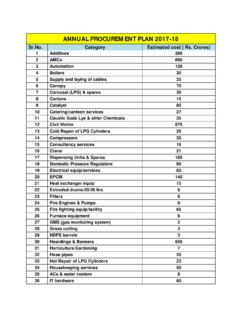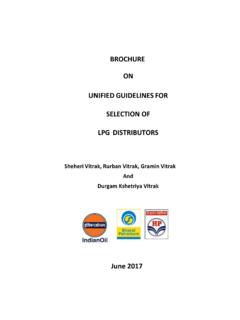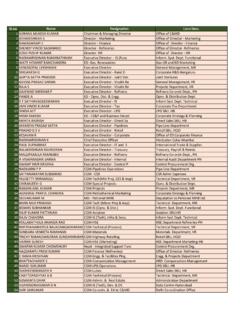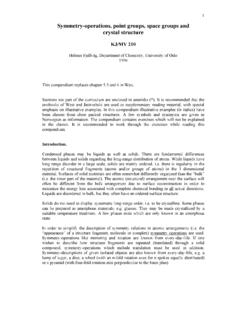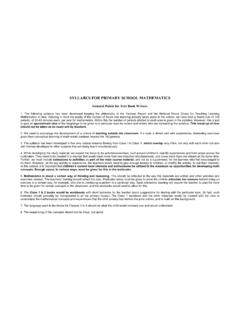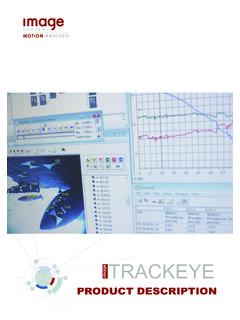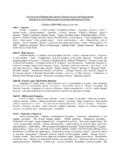Transcription of Important Information - About Computer Based Test (CBT)
1 Important Information - About Computer Based Test (CBT). The Computer Based test (CBT) is scheduled to be held on Sunday, 14th October,2018 for the following streams only i. FTPA: BSC/MSc Chemistry/Microbiology/Biotechnology ii. FTPA: Diploma Chemical Engineering/Chemical Technology/Petroleum Refining iii. FTRA: M-Tech Chemical Engineering Chemical Engineering/Petroleum Refining & Petrochemicals iv. FTRA: M-Tech Electrical/Electronics/Mechanical Engineering Admit card with venue details and other instructions shall be sent to the candidates after review of the application, subject to the meeting of eligibility criteria. The admit card shall be sent to the registered e-mail id and has to be brought to the test centre. Candidates are required to download admit card online as no separate physical copy of the admit card will be dispatched. For Queries related to CBT/Admit Card etc Candidates can contact helpline No: 022- 62507717, Email: Syllabus for Fixed Term Project Assistants 1.
2 BSC/MSC -Chemistry Exam Syllabus Inorganic Chemical periodicity, Structure and bonding in homo- and heteronuclear molecules, Chemistry VSEPR Theory, Concepts of acids and bases, Main group elements and their compounds: synthesis, structure and bonding, Transition elements and coordination compounds, spectral and magnetic properties, Organometallic compounds: synthesis, bonding and structure, reactivity and catalysis, Analytical chemistry- separation, spectroscopic, electro- and thermoanalytical methods, Characterization of inorganic compounds by IR, Raman, NMR, EPR, UV-vis, MS, electron spectroscopy and microscopic techniques, Nuclear chemistry: nuclear reactions, fission and fusion, radio-analytical techniques Physical Basic principles of quantum mechanics: Postulates; operator algebra; particle-in-a-box, Chemistry harmonic oscillator, hydrogen atom, tunneling; Atomic structure and spectroscopy; MO. and VB theories; Chemical applications of group theory; symmetry elements; point groups, Molecular spectroscopy: Rotational, vibrational spectra; electronic spectra; IR.
3 And Raman Spectra selection rules; magnetic resonance, Chemical thermodynamics: Laws, state and path functions; Maxwell's relations; spontaneity and equilibria; Le Chatelier principle; phase equilibria and phase rule; thermodynamics of gases, and solutions. Statistical thermodynamics: Boltzmann distribution; kinetic theory of gases;. Electrochemistry, Chemical kinetics: Empirical rate laws, temperature dependence;. steady state approximation; determination of reaction mechanisms; collision and transition state theories, enzyme kinetics, Colloids and surfaces; isotherms and surface area; heterogeneous catalysis Solid state: Crystal structures; Bragg's law; Polymer chemistry, Data analysis: Mean and standard deviation; absolute and relative errors Organic IUPAC nomenclature, stereochemistry: Configurational and conformational isomerism;. Chemistry stereogenicity, stereoselectivity, enantioselectivity, diastereoselectivity and asymmetric induction.
4 Aromaticity, Organic reactive intermediates: carbocations, carbanions, free radicals, carbenes, benzynes and nitrenes: Organic reaction mechanisms: addition, elimination and substitution reactions with electrophilic, nucleophilic or radical species. Common named reactions and rearrangements. Organic transformations: Functional group interconversion; common catalysts and reagents, Chemo, regio and stereoselective transformations. Asymmetric synthesis,substrate, reagent and catalyst controlled reactions; enantiomeric resolution optical and kinetic; Pericyclic reactions;. photochemical reactions, heterocyclic compounds; Chemistry of natural products: Carbohydrates, proteins and peptides, fatty acids, nucleic acids, terpenes, steroids and alkaloids, structure determination by IR, UV-Vis, 1H & 13C NMR and Mass spectroscopic techniques. 2. BSC/MSC -Microbiology/Biotechnology Exam Syllabus Microbiology/Biotechnology Microbiology- bacteria, yeast and fungus, Culturing methods, Alcohol and acid fermentations, Bioconversion, Lignocellulosic biofuels, 3G fuels, bioprocesses, upstream and downstream processing, Fundamentals of Microbial molecular biology and techniques, molecular biology instruments, Basic biochemistry.
5 3. Diploma- Chemical Engineering/Chemical and Petroleum Refining Exam Syllabus Process Calculations and Thermodynamics Steady and unsteady state mass and energy balances including multiphase, multicomponent, reacting and non-reacting systems. Use of tie components; recycle, bypass and purge calculations; Gibb's phase rule and degree of freedom analysis. First and Second laws of thermodynamics. Applications of first law to close and open systems. Second law and Entropy. Thermodynamic properties of pure substances: Equation of State and residual properties, properties of mixtures: partial molar properties, fugacity, excess properties and activity coefficients; phase equilibria: predicting VLE of systems; chemical reaction equilibrium Fluid Mechanics and Mechanical Operations Fluid statics, Newtonian and non-Newtonian fluids, shell-balances including differential form of Bernoulli equation and energy balance, Macroscopic friction factors, dimensional analysis and similitude, flow through pipeline systems, flow meters, pumps and compressors, elementary boundary layer theory, flow past immersed bodies including packed and fluidized beds, Turbulent flow: fluctuating velocity, universal velocity profile and pressure drop.
6 Particle size and shape, particle size distribution, size reduction and classification of solid particles;. free and hindered settling; centrifuge and cyclones; thickening and classification, filtration, agitation and mixing; conveying of solids. Heat Transfer Steady and unsteady heat conduction, convection and radiation Thermal boundary layer and heat transfer coefficients Boiling, condensation and evaporation Types of heat exchangers and evaporators and their process calculations, cooling towers, furnace calculations. Design of double pipe, shell and tube heat exchangers, and single and multiple effect evaporators. Mass Transfer Fick's laws, molecular diffusion in fluids, mass transfer coefficients, film, penetration and surface renewal theories; momentum, heat and mass transfer analogies;. Stage-wise and continuous contacting and stage efficiencies; HTU & NTU concepts Design and operation of equipment for distillation (flash, multi-component distillation etc), absorption and stripping, leaching, liquid- liquid extraction, drying, membrane separation, humidification, dehumidification and adsorption.
7 Chemical Reaction Engineering Theories of reaction rates Kinetics of homogeneous reactions, interpretation of kinetic data, single and multiple reactions in ideal reactors, non-ideal reactors Development of rate laws, Non-isothermal reactors Instrumentation and Process Control Measurement of process variables Sensors, transducers and their dynamics Process modeling and linearization Transfer functions and dynamic responses of various systems, systems with inverse response, process reaction curve, controller modes (P, PI, and PID). Control valves; analysis of closed loop systems including stability, frequency response, controller tuning, cascade and feed forward control. Chemical Technology Inorganic chemical industries (sulfuric acid, phosphoric acid, chlor-alkali industry). Fertilizers (Ammonia, Urea, SSP and TSP). Natural products industries (Pulp and Paper, Sugar, Oil, and Fats). Petroleum refining and petrochemicals Polymerization industries (polyethylene, polypropylene, PVC and polyester synthetic fibers).
8 Syllabus for Fixed Term Research Associates 1. -Chemical Engineering Exam Syllabus Process Steady and unsteady state mass and energy balances including multiphase, Calculations and multicomponent, reacting and non-reacting systems. Thermodynamics Use of tie components; recycle, bypass and purge calculations; Gibb's phase rule and degree of freedom analysis. First and Second laws of thermodynamics. Applications of first law to close and open systems. Second law and Entropy. Thermodynamic properties of pure substances: Equation of State and residual properties, properties of mixtures: partial molar properties, fugacity, excess properties and activity coefficients; phase equilibria: predicting VLE of systems;. chemical reaction equilibrium. Fluid Mechanics Fluid statics, Newtonian and non-Newtonian fluids, shell-balances including and Mechanical differential form of Bernoulli equation and energy balance, Operations Macroscopic friction factors, dimensional analysis and similitude, flow through pipeline systems, flow meters, pumps and compressors, elementary boundary layer theory, flow past immersed bodies including packed and fluidized beds, Turbulent flow: fluctuating velocity, universal velocity profile and pressure drop.
9 Particle size and shape, particle size distribution, size reduction and classification of solid particles; free and hindered settling; centrifuge and cyclones; thickening and classification, filtration, agitation and mixing;. conveying of solids. Heat Transfer Steady and unsteady heat conduction, convection and radiation Thermal boundary layer and heat transfer coefficients Boiling, condensation and evaporation Types of heat exchangers and evaporators and their process calculations, cooling towers, furnace calculations. Design of double pipe, shell and tube heat exchangers, and single and multiple effect evaporators. Mass Transfer Fick's laws, molecular diffusion in fluids, mass transfer coefficients, film, penetration and surface renewal theories; momentum, heat and mass transfer analogies;. Stage-wise and continuous contacting and stage efficiencies; HTU & NTU. concepts Design and operation of equipment for distillation (flash, multi-component distillation etc), absorption and stripping, leaching, liquid-liquid extraction, drying, membrane separation, humidification, dehumidification and adsorption.
10 Chemical Theories of reaction rates Reaction Kinetics of homogeneous reactions, interpretation of kinetic data, single and Engineering multiple reactions in ideal reactors, non-ideal reactors Development of rate laws, Residence time distribution, single parameter model Non-isothermal reactors Catalysis and catalytic reactions, catalyst deactivation and regeneration, Kinetics of heterogeneous catalytic reactions Diffusion effects in catalysis. Different type of industrial reactors - Fixed bed, fluidized bed, trickle bed, slurry bed Instrumentation and Measurement of process variables Process Control Sensors, transducers and their dynamics Process modeling and linearization Transfer functions and dynamic responses of various systems, systems with inverse response, process reaction curve, controller modes (P, PI, and PID) Control valves; analysis of closed loop systems including stability, frequency response, controller tuning, cascade and feed forward control.





